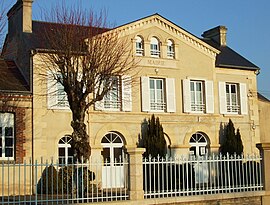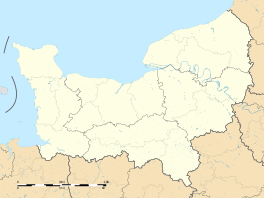La Hoguette
| La Hoguette | ||
|---|---|---|

Town hall
|
||
|
||
| Coordinates: 48°52′42″N 0°09′32″W / 48.8783°N 0.1589°WCoordinates: 48°52′42″N 0°09′32″W / 48.8783°N 0.1589°W | ||
| Country | France | |
| Region | Normandy | |
| Department | Calvados | |
| Arrondissement | Caen | |
| Canton | Falaise | |
| Intercommunality | Pays de Falaise | |
| Government | ||
| • Mayor (2008–2014) | Alain Guilmart | |
| Area1 | 24.44 km2 (9.44 sq mi) | |
| Population (2011)2 | 699 | |
| • Density | 29/km2 (74/sq mi) | |
| Time zone | CET (UTC+1) | |
| • Summer (DST) | CEST (UTC+2) | |
| INSEE/Postal code | 14332 /14700 | |
| Elevation | 89–267 m (292–876 ft) (avg. 220 m or 720 ft) |
|
|
1 French Land Register data, which excludes lakes, ponds, glaciers > 1 km² (0.386 sq mi or 247 acres) and river estuaries. 2Population without double counting: residents of multiple communes (e.g., students and military personnel) only counted once. |
||
1 French Land Register data, which excludes lakes, ponds, glaciers > 1 km² (0.386 sq mi or 247 acres) and river estuaries.
La Hoguette is a commune in the Calvados department in the Normandy region in northwestern France.
La Hoguette is also the type site of the early Neolithic La Hoguette culture that is found mainly in association with Linearbandkeramic or Limburg pottery in Northern France, The Netherlands, Alsace and Western Germany. It is believed to ultimately derive from the Mediterranean Cardial-Traditions. Important sites of the La-Hoguette culture include Stuttgart-Wilhelma, Dautenheim and Godelau.
The La Hoguette pottery was found under a later megalithic tomb and first misidentified as Linearbandkeramic. La Hoguette marks the westernmost point of the distribution of this culture. The place name La Hoguette is believed to derive from the Old Norse word Haugr meaning a knoll or a hill.
La Hoguette was the birthplace of Georges Marchais (1920–1997), head of the French Communist Party.
...
Wikipedia



